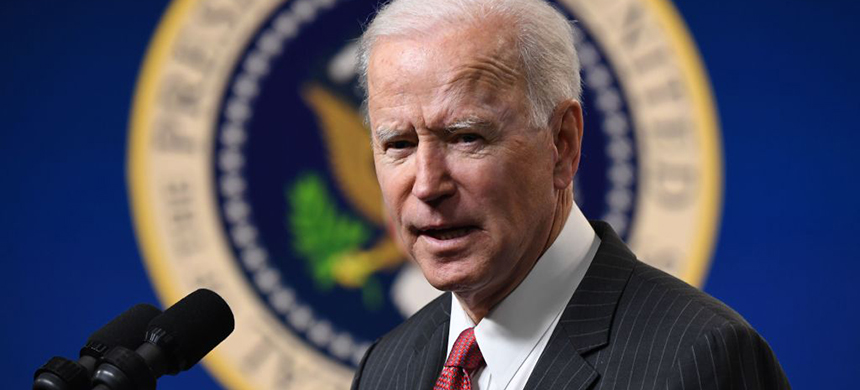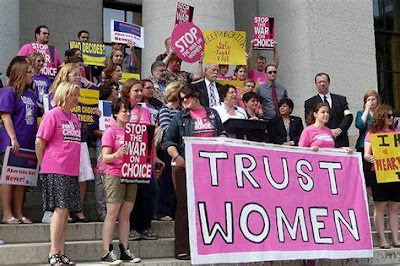
President Joe Biden in Washington, DC, 2021. (photo: Saul Loeb/AFP/Getty Images)
Dan Rather and Elliot Kirschner Steady
31 January 22
It was as predictable as the phases of the moon, with just as much lunacy.
We all knew that as soon as there was a Supreme Court vacancy, President Biden’s pledge to appoint the first Black woman to the highest court would elicit the bad-faith howls of opprobrium from the political right.
From some, the more uncouth and unabashed, the racism and misogyny has been a blatant foghorn. But even those who try to wrap their true feelings in earnest lectures on equality and color-blindness, cannot hide their true intentions. They might think they were blowing a dog whistle, but no one is fooled.
Let’s start by getting one thing straight - Is there a shortage of Black women with the wisdom, talent, intelligence, savvy, and moral standing to be a worthy justice on the Supreme Court? Of course not.
How dare President Biden use “identity politics” to limit his search, says the political party that reveres President Reagan (or at least used to). Never mind that Reagan pledged, and then delivered, on his promise to appoint the first woman to the Court. Shame in the face of hypocrisy? Yeah, right.
And let’s be clear, as many others have noted, if you look at the portraits of the 115 justices who have served on the Court, 108 have been White men. It’s hard to conclude anything else than that there's some serious identity politics at play. Dig a little deeper into the Supreme Court history and you will hear of such things as the “Jewish seat” and the “Catholic seat.” So spare me. There also seems to be a lot of seats reserved for “presidents who lose the popular vote.”
What should not be lost in this moment is that in many ways this nation has made great strides on race and gender, even as the undertow of bigotry and sexism still pulls strongly at our national sense of justice. I remember when Thurgood Marshall became the first Black justice, and when Sandra Day O'Connor became the first woman. Both were shocks to the system. And both changed the Court for the better. Yes we want our justices to be scholars but we also should want them to reflect the country. And guess what. It turns out they can do both.
With this in mind, I have long worried about how narrow the spectrum of experience and background is among the current and recent set of justices, where almost all have gone to a cadre of elite schools and spent most of their professional careers in government and academia.
As a product of public schools, including college, I would like to see greater diversity of academic background on the court. You can get a great education, learn about life, the law, empathy, and justice, perhaps more so, at a State U too.
Law professors and those who work in government serve important functions in teaching and practicing a certain type of law, but there is something to be said for what it takes to be in courtrooms, as a prosecutor and as a defense attorney - especially a public defender.
The Supreme Court is asked to rule about labor issues and the environment, science and the economy, business and criminal justice. I hope we can find more justices who share this kind of broad knowledge, and lived experience. And while we’re talking about having justices who understand the injustice this nation has wrought, I hope sometime we will find one of Native American ancestry.
In a quirk of timing, the Court announced it will soon hear a challenge to affirmative action, and likely with the new justice in place. Most observers believe the justices will strike down the practice as it applies to education, which will likely lead to affirmative action being struck down more generally.
Now a detailed discussion of what affirmative action is, how it is used, and some of its complexities is best left for another column. But for the sake of contextualizing it in relation to this current moment for the Court, I think it is fair to say that if we lived in a truly equal society the practice would not be necessary. And I also think that there are some aspects of its current practice upon which those acting in good can have honest disagreement.
But good faith is not the strong suit of those attacking affirmative action. They like to argue that it is discriminatory to make choices on the basis of race. That presupposes many arguments that turn out to be fallacies. For one, it suggests that affirmative action is the only way race is considered in how people are hired or accepted to school.
This ignores the historical legacy, as well as the overt and inherent biases that are indelibly imprinted in American culture. And if we really wanted a level playing field around such things as college admissions, then let’s do away with “legacy” admissions, as in those that favor children who have a parent (or in some cases many generations) of alumni at a given institution (like Brett Kavanaugh). And by most accounts Jerod Kushner’s dad bought him into Harvard. Right, there is never a consideration of money or who your parents are when people get into college or get a job (sarcasm intended).
Let’s cut through a lot of the underbrush here and state a couple things. America is a land of opportunity. It is a place where people can come from nothing and become something. My own life’s journey offers some evidence of that. But it is also an inherently unequal society. This is due in large part to the shadows of our history which still darken the life opportunities for many.
One thing that I have learned, with lessons coming in every chapter of my life, is that we are a stronger country, a better country, a country more aligned with our highest ideals, when we embrace our differences. That we can learn from others, hear their stories, come to understand and love people very different from ourselves, this is a feature of the United States that we should embrace.
Bringing more diversity into our schools, our workplaces, our government, our courts, and our lives, doesn’t just help those who now have access they didn’t have before, it helps all of us. It helps the United States. And it is the symbol we can be for the world that a multi-ethnic, multicultural grand communal experiment can be successful. And thus, by extension, we can learn to live with each other on this precious, precarious planet.
If there was only one college that was any good, if there was only one kind of mind that made for a good justice, if there was only one job path that was each of our destinies, then this would be a different conversation. But that isn’t how the world works. Not by a long shot.
We go through life enriched by our experiences, and our experiences are enriched when we are exposed to different ways of thinking from people very different from ourselves. We need someone on the Supreme Court to be able to say, “that’s how you may see things, but this is where I am coming from. And you have no choice but to listen.”
Everyone, even the vast majority of us who will never wear the black robes of a Supreme Court justice, would do well to listen more to the wonderful diversity of voices that make up our beloved United States. This is, after all, a vital part of what really makes America great.
"Yes we want our justices to be scholars but we also should want them to reflect the country. And guess what. It turns out they can do both."



No comments:
Post a Comment